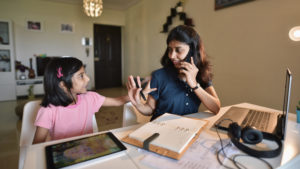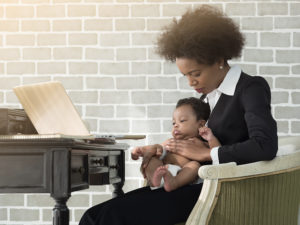Moms First and the Geena Davis Institute on Gender in Media Release New Report on the Cultural Portrayals of Motherhood on TV; Call on Entertainment Industry to “Rewrite Motherhood”
The survey, conducted by APCO Worldwide, found that the majority of moms dread returning to work after caregivFindings from the first-of-its-kind report show that while portrayals of motherhood on TV have improved historically, the realities of motherhood are often absent from television and reinforce harmful stereotypes
LOS ANGELES, CA (March 7, 2024) – Today, Moms First, a national non-profit fighting for the structural supports like paid leave, childcare, and equal pay that moms need to thrive, in partnership with the Geena Davis Institute on Gender in Media, released a groundbreaking, first-of-its-kind report that examines the cultural portrayals of motherhood in television. The report was developed with the support of Meghan, The Duchess of Sussex and The Archewell Foundation.
The report, Rewriting Motherhood: How TV Represents Moms and What We Want To See Next, examined scripted television programs from 2022 that featured mothers in the title cast. Its findings paint a nuanced landscape of motherhood with specific progress made across the industry in the depiction of more diverse moms on TV. The report also lifts up portrayals of motherhood that represent unrealistic expectations for moms in today’s society and contribute to the guilt and shame moms experience today.
The report’s topline findings include:
- TV moms have become slightly more diverse – though there is still work to be done, as Latinx (9% of TV moms), LGBTQIA+ (6%), disabled (0%), fat (2%), and older (10%) moms are all underrepresented.
- For TV families, when the narrative implied the breadwinner in a couple with kids under 18, it was the father 86.5% of the time, and it was the mother just 13.5% of the time. Thus, dads are significantly overrepresented and moms underrepresented as primary earners in TV homes.
- TV moms do not seem to have the same concerns about their physical appearance or meeting cultural beauty standards as real world moms, and the work required to reach these standards is erased on television.
- The work involved to keep a home functional and clean and the emotional load of this responsibility to do this, is largely erased on TV. Only 15% of TV parents were shown doing domestic tasks like cooking or cleaning, yet less than 10% of TV parents had a messy house.
- The realities of childcare are largely invisible on TV. Only 20% of TV parents with kids 10 and under were shown to have any childcare.
- Moms make everyday sacrifices for their kids, and regularly put their kids’ needs first, but these realities are often missing from moms’ TV depictions. Sacrifices were rarely shown, and when they were, more than half of the time it was big life-or-death choices (55% of the time) rather than the everyday issues that real moms actually encounter, such as staying up with a newborn, feeding kids’ playmates while also struggling with money, and making financial and career decisions that benefit their family more than themselves.
“We can’t win the fight for moms unless we shift our cultural expectations of motherhood — that starts with changing the way moms show up in the media we consume. Moms First is proud to partner with the Geena Davis Institute and The Archewell Foundation to call on the entertainment industry to more fully represent moms in today’s media,” said Reshma Saujani, founder and CEO of Moms First. “It’s time for a rewrite of motherhood so that moms finally see themselves reflected in the characters that shape our culture. We urge producers, writers, and showrunners to hire and support moms with the paid leave and child care they need so they can write authentic stories of moms that not only entertain us but also resonate with our own lives.”
The report makes clearcut recommendations for entertainment industry executives to more fully develop the characterization of motherhood in TV programming as well as invest in structural supports like child care, paid family leave, and flexible work policies that allow moms to work and thrive as employees in the industry.
“My past experience as an actress, and now today as a producer and mother, have amplified my belief in the critical importance of supporting women and moms both behind the lens and in front of it. This report about the portrayal of mothers in entertainment highlights the gaps we need to fill to achieve true representation in the content we create and consume, and I’m honored to support this work through The Archewell Foundation,” said Meghan, The Duchess of Sussex, co-Founder of The Archewell Foundation.
“I was inspired to found the Geena Davis Institute 20 years ago when I realized there was a huge gender disparity in the preschool shows and animated movies aimed at kids like my toddler daughter. But representation doesn’t just matter for children – we are all impacted by how we are reflected in popular culture. Moms deserve to see authentic and validating portrayals of motherhood on screen,” said Geena Davis, founder and chair of the Geena Davis Institute on Gender in Media.
View the full report and its recommendations.
For more information, register here to join Moms First and the Geena Davis Institute for a virtual event to discuss the report’s findings on Wednesday, March 20 at 3pm ET, 12pm PT.
About Moms First
Moms First is a national, non-profit organization transforming our workplaces, communities, and culture to enable moms to thrive. Our grassroots movement of more than one million moms and supporters is dedicated to advancing women’s economic freedom, uplifting the vital work of moms in our society, and building the power to win the public and private sector investments moms need and deserve, including child care, paid leave, and equal pay.
About the Geena Davis Institute on Gender in Media
Since 2004, the Institute – founded by Two-Time Academy Award Winning Actor Geena Davis – has worked to mitigate unconscious bias by creating equality, fostering inclusion and reducing negative stereotyping on screen in entertainment and media. As one of the top global research-based organizations, the Institute provides research, direct guidance and thought leadership aimed at increasing representation of marginalized groups within six identities: gender, race/ethnicity, LGBTQIA+, disability, age, and body type. Because of its unique history and position, the Institute is trusted by leaders in the entertainment industry to help achieve true onscreen equity in a way that few organizations can.
About The Archewell Foundation
The Archewell Foundation is a non-profit organization founded by Prince Harry and Meghan, The Duke and Duchess of Sussex. Our mission is simple: show up, do good. We meet the moment by showing up, taking action and using our unparalleled spotlight to uplift and unite communities — local and global — through acts of service and compassion. We consciously partner with key organizations and leaders to identify immediate needs, build meaningful initiatives, and drive long-term change. We are committed to uncovering and resolving the root causes of issues, prioritizing lasting solutions over temporary fixes. Our work is underpinned by the core belief that mental health and our collective wellbeing are paramount.
###


